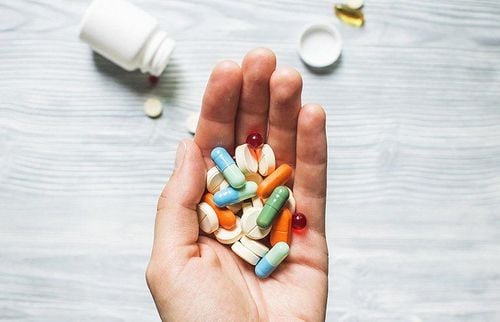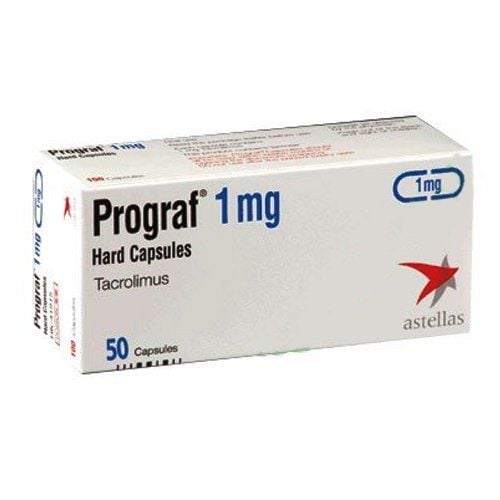This is an automatically translated article.
Rapamune is used with other medicines to prevent kidney transplant rejection. The main ingredient of the drug is Sirolimus, which belongs to the group of immunosuppressive drugs. Medicines work to weaken your body's defense system (immune system) to help your body accept the newly transplanted organs.1. Indications and contraindications of Rapamune
Rapamune is indicated in the following cases:Prevention of kidney transplant rejection Prevention of heart transplant rejection Lymphoma hemangioma kaposiform Lymphatic capillary malformation Lung disease LAM (lymphohangioleiomyomatosis) Rapamune drug is contraindicated in the following cases:
Cytomegalovirus infection Pneumonia caused by the fungus Pneumocystis jiroveci. Severe infection Cancer or malignancy High cholesterol High levels of triglycerides in the blood Too much fat in the blood High blood pressure Pericardial effusion Pulmonary effusion Liver disease Decreased kidney function Male infertility Possible fluid retention see Water retention in feet, hands. Ascites Increased protein in the urine Slow-healing stains Pregnancy Women who are breastfeeding Liver transplant Lung transplant Blood clots in the liver after a liver transplant A bronchial stoma where the transplanted lung surgical connection comes off. Lung tissue problems Progressive multifocal encephalopathy, a type of brain infection. Lymphedema or swelling caused by blockage of the lymph nodes. Skin cancer Kidney problems caused by BK polyomavirus.

Thuốc Rapamune được sử dụng với các loại thuốc khác để ngăn chặn việc thải ghép thận
2. How to use Rapamune
Carefully read the medication instructions provided by your doctor before you start taking Rapamune and each time you give a refill. If you have any questions about how to use this medicine, ask your doctor.Take Rapamune by mouth as directed by your doctor, usually once daily. If you have nausea or an upset stomach, you can take the medicine with food. However, it is important to choose one way (with or without food) and take this medication the same way every time.
Carefully measure the dose of Rapamune using the dose syringe provided, do not use a household spoon. Mix the measured dose with at least a quarter cup/60ml of water or orange juice in a plastic or glass container. Do not mix Rapamune with any other liquid, stir well and drink the mixture immediately. Add at least half a cup/120ml of water or orange juice to the container, stir and drink immediately.
The oral dose syringe should be used only once and thrown away, using a new syringe for each dose of Rapamune.
Rapamune dosage is calculated based on your weight, medical condition, laboratory tests (such as sirolimus trough levels), and response to treatment.
Take Rapamune medicine regularly to get the most benefit from it. To help you remember to take your medication, take it at the same time each day.
Do not increase your dose or take Rapamune more often than prescribed. Doing this will not help your condition improve faster, it will also increase your risk of side effects. Also, do not stop taking Rapamune without consulting your doctor.
If you are also taking cyclosporin, take Rapamune 4 hours after your cyclosporin dose. Avoid eating grapefruit or drinking grapefruit juice while using Rapamune unless your doctor says you can safely do so, because grapefruit can increase the risk of side effects with this medicine.
If you are taking Rapamune to treat LAM lung disease, tell your doctor if your condition worsens.
Tests such as kidney function, liver function, cholesterol/triglyceride level, urine protein test, sirolimus trough level will be performed periodically to monitor your progress or check for side effects during the process of using Rapamune.
If you have had an organ transplant, attend a transplant education class or support group to learn more about signs of organ rejection such as feeling sick, fever, or pain/aching around muscles organs are transplanted. Tell your doctor right away if you notice any of these signs.

Nếu bạn đang dùng thuốc Rapamune để điều trị bệnh phổi LAM, hãy cho bác sĩ biết nếu tình trạng của bạn xấu đi.
3. Rapamune drug side effects
While taking Rapamune, you may experience diarrhea, joint pain, tremors, acne, or trouble sleeping. If any of these side effects persist or get worse, tell your doctor right away.Remember that your doctor has prescribed this medicine for you because he or she has judged that the benefit to you is greater than the risk of side effects. Many people use Rapamune without any serious side effects.
Tell your doctor right away if you have any serious side effects of Rapamune, including: Nausea/vomiting that doesn't stop, yellowing eyes/jaundice, dark urine, muscle pain/ cramps, bone pain, increased thirst/hunger, frequent urination, hearing problems (such as hearing loss, ringing in the ears), unusual tiredness, fast/slow/irregular heartbeat, easy bruising /bleeding, mental/mood changes, swollen ankles/feet, severe headache, dizziness, stomach/abdominal pain, missed period/menstrual bleeding/pain, signs of other symptoms kidney problems (such as change in the amount of urine, foamy urine), pain/redness/swelling of arms or legs, swelling of the abdomen.
Get medical help right away if you have any very serious side effects of Rapamune, including: Chest pain, trouble breathing.
Although rare, Rapamune may increase your risk of getting a potentially fatal brain infection (progressive multifocal encephalopathy-PML). Get medical help right away if you have any of the following symptoms: Clumsiness, loss of coordination/balance, weakness, sudden changes in your thinking (such as confusion, difficulty concentration, memory loss), difficulty speaking, difficulty walking, seizures, vision changes.
Sirolimus might slow healing after surgery. Tell your doctor right away if you have signs that your surgical wound is not healing well such as redness, swelling, pain. The risk of slow wound healing is higher if you are obese.
Sirolimus may increase cholesterol/triglycerides. You may be asked to have your cholesterol/triglycerides checked periodically and/or take another medicine to control your cholesterol/triglycerides.
Sirolimus can often cause a rash, but it's usually not serious. However, you may not be able to tell if it's a common rash or a sign of a serious reaction. So you need to get medical help right away if you have any rash.
A very serious allergic reaction to Rapamune is very rare. However, if you have any symptoms of a serious allergic reaction to Rapamune, including: rash, itching/swelling (especially of the face/tongue/throat), trouble breathing or severe dizziness important, get medical help right away.
The following are the side effects of Rapamune by likelihood:
Common Rapamune side effects include:
Low blood potassium Anemia Decreased blood platelets Blood pressure Decreased kidney function Amount high blood triglycerides Common cold Constipation Acne Joint pain Muscle pain Dizziness Fever Pain Visible fluid retention Headache Nausea Diarrhea Severe abdominal pain

Thiếu máu là một trong các tác dụng phụ thường gặp của thuốc Rapamun
Hemolytic uremic syndrome. Low white blood cell count Thrombocytopenic purpura Lymphocele, a cyst containing lymph fluid. Pyelonephritis Slow wound healing after surgery Stomatitis Ovarian cysts Menstrual problems Nose bleeds Osteonecrosis Rare side effects of Rapamune include:
Diarrhea caused by Clostridium difficile infections Mycobacteria Herpes Simplex Infections Mononucleosis Cytomegalovirus Infections Viral Infections Pneumocystis Jirovecii Pneumonia Infections Infections Malignant melanoma Squamous cell carcinoma Diabetes Low blood phosphate levels Potassium levels high in the blood Thrombocytopenia Low level of neutrophils A blood clot in the lungs Pulmonary arterial hypertension Pericardial effusion Pericardial occlusion Blood vessel blockages due to blood clots Allergic reactions causing inflammation of the blood vessels Blood clots in the blood vessels deep veins in the limbs. Bronchiolitis Obstructive Pneumonia Pneumonia Interstitial Pneumonia Pulmonary fibrosis Diaphragmatic hernia Dead liver tissue Hepatitis Nephrotic syndrome Skin rash with peeling Shortness of breath Chest pain Ascites Anaphylaxis Angioedema Hypersensitivity reaction to drug Post-transplant lymphoid tissue disorders Lymphoma Blood clots in the liver after a liver transplant A bronchial stoma where the transplanted lung surgical connection comes off. Bleeding from the lungs Lung tissue problems Pancreatitis Brain infections Focal segmental glomerulosclerosis. Kidney problems caused by BK Polyomavirus Sepsis High level of Transaminase Alanine High level of Transaminase Aspartate Low sperm count Basal cell carcinoma Lymphedema or swelling due to blockage of lymph nodes No sperm in the semen Merkel Cell Carcinoma Tachycardia This is not a complete list of possible side effects Rapamune. If you notice other side effects of Rapamune not listed above, contact your doctor right away.

Nếu bạn nhận thấy các tác dụng phụ khác của Rapamune hãy liên hệ với bác sĩ của bạn ngay lập tức
4. Measures to prevent side effects of the drug Rapamune
Before taking Rapamune, tell your doctor if you are allergic to this medicine or temsirolimus, and to any other allergies, if any. Rapamune products may contain ineffective ingredients that may cause allergic reactions or other problems.Tell your doctor about your medical history before using Rapamune, especially of: Liver disease, high cholesterol/triglyceride levels, cancer, any existing or recent infections.
You may be more susceptible to infection or an existing infection may be aggravated while using Rapamune. Wash your hands well to prevent the spread of germs. Avoid contact with people who have an infection that can spread to others (such as chickenpox, measles, flu).
Do not have any vaccinations/vaccinations during treatment with Rapamune, without your doctor's consent. Avoid contact with people who have recently received a live vaccine (such as the flu vaccine inhaled through the nose).
Rapamune may increase your risk of developing skin cancer. Limit your time in the sun, avoid outdoor booths, use sunscreen, and wear protective clothing when outdoors.
Before surgery, tell your doctor or dentist that you are being treated with Rapamune.
Rapamune may affect male fertility.
Tell your doctor if you are pregnant or plan to become pregnant, because you should not become pregnant while taking Rapamune, Sirolimus can harm an unborn baby. Ask your doctor about reliable forms of birth control while using and for 12 weeks after stopping treatment with this medicine. If you become pregnant while using Rapamune, talk to your doctor right away about the risks and benefits of the medicine to you and your unborn baby.
Rapamune can pass into breast milk and may have unwanted effects on a newborn baby. It is therefore not recommended that women breast-feed during treatment with this medicine.
5. Rapamune drug interactions
Drug interactions can change the way Rapamune works or increase your risk of serious side effects. Tell your doctor about all prescription/nonprescription drugs and herbal products. Do not start, stop, or change the dose of any medicine during treatment with Rapamune, without your doctor's approval.Some products that may interact with Rapamune include: ACE inhibitors (such as benazepril, lisinopril), other drugs that weaken the immune system/increase the risk of infection (such as natalizumab, rituximab , tacrolimus).
Certain medicines can affect the removal of sirolimus from your body, which may affect how Rapamune works, including azole antifungals (such as itraconazole, ketoconazole, itraconazole), enzalutamide, macrolide antibiotics (such as clarithromycin, erythromycin), mifepristone, HIV and HCV protease inhibitors (such as indinavir, ritonavir, telaprevir), rifamycins (such as rifampin, rifabutin), St. John's wort and some other drugs.
Sirolimus is very similar to temsirolimus. Do not use medicines containing temsirolimus while using Rapamune.

Tương tác thuốc có thể thay đổi cách hoạt động của thuốc Rapamune hoặc làm tăng nguy cơ mắc các tác dụng phụ nghiêm trọng
6. What to do if you overdose or forget to take Rapamune?
If you or someone else has overdosed on Rapamune and has severe symptoms such as fainting or difficulty breathing, call 911 right away.If you miss a dose of Rapamune, take it as soon as you remember. If it is almost time for your next dose, skip the missed dose, use your next dose of Rapamune at the usual time and do not take a double dose.
7. How to store Rapamune thuốc
Store Rapamune in the refrigerator, protect from light, keep the vial upright, do not freeze the medicine. If needed, Rapamune can also be stored for short periods at room temperature. Check the product package for how long your brand can be stored at room temperature, or ask your doctor. Do not store Rapamune in the bathroom and keep it away from children and pets.After opening the vial, Rapamune can be used within 30 days. If the medicine is stored in an oral syringe with the cap on, it must be used within 24 hours.
When refrigerated, the medicine in the bottle may be slightly foggy. If this fog occurs, leave the medicine at room temperature and shake gently until the fog disappears then use. Fog does not affect the quality of the drug.
Dispose of Rapamune medication appropriately when it expires or is no longer needed by you.
Please dial HOTLINE for more information or register for an appointment HERE. Download MyVinmec app to make appointments faster and to manage your bookings easily.
Reference source: webmd.com












